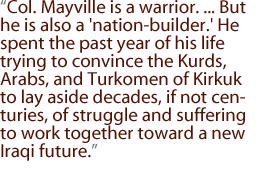
This month, a quarter of a million men and women will be trading places as the largest troop rotation in U.S. history gets underway in Iraq. As they cycle out and in, the U.S. effort in Iraq will go through an awkward, and likely dangerous, transition period. Inevitably, balls will be dropped. Instructions will be misunderstood. And what is gained by getting fresh troops in place will be countered by the loss of hard-won know-how, acquired through an arduous and painful process of trial-and-error over these past 10 months.
In November and December, we had the opportunity to spend some time with a few of those soldiers as their year-long stints drew to a close. We were able to discuss the difficult, at times impossible, task of transforming Iraq from a dictatorship to a democracy. Some of those conversations are included in the final cut of the film; others are reflected in these dispatches we wrote along the way.
As we finished the film, we decided to get in touch with a few of those soldiers for some final thoughts as they packed to leave. We received prompt and thoughtful replies. The most memorable came from Colonel Bill Mayville, commander of the 173rd Airborne in Kirkuk, the strategically vital city in northern Iraq. I'm including his e-mail below.
Remember, Col. Mayville is a warrior. We went with him on a raid in the town of Hawija. You can watch it unfold in the film -- he does what you'd expect a soldier to do. But Mayville is also a "nation-builder." He spent the past year of his life trying to convince the Kurds, Arabs, and Turkomen of Kirkuk to lay aside decades, if not centuries, of struggle and suffering to work together toward a new Iraqi future. That's no small task in a place of overwhelming history: a history of great bloodshed, numerous vendettas, countless betrayals.
|

Whether the U.S. military can or should be taking on the tasks that candidate Bush himself derided as inappropriate in 2000 is an issue that Mayville and other officers are eager to debate. Some accept the mission with enthusiasm. Others are quite bitter about being handed a thankless job for which they were never adequately briefed or trained. They are critical of the "politicians" who sent them. But, then, what else is new in war? Soldiers are used to following orders, even if they are vague and ill-conceived ... even if the job of "nation-building" has fallen on the shoulders of the U.S. military because the architects of the war in Washington had no real postwar plan.
Life in Iraq is stressful. As of Feb. 10, 534 American soldiers have died, and another 2,604 have been wounded since the war began. And while the precise number of Iraqi civilian casualties is unknown, some tallies of Iraqis killed range as high as 10,000. Many more have been wounded. With all this killing and suffering in mind as he prepared to depart, Col. Mayville sent a poem to my co-producer, Marcela Gaviria, last week.
Martin Smith
Feb. 10, 2004
Boston, Mass.

E-mail from Col. William Mayville, Commander, 173rd Airborne Brigade, U.S. Army:
Feb. 6, 2004
Marcela,
It is time for us to leave Kirkuk, our slice of Mesopotamia. There has been a good rain this winter and I anticipate wild flora will soon carpet large portions of the province. The hills of the Kani Damlan are already green and yellow. If we are lucky, we might see wildflowers from the airplanes that take us home and if we do, then perhaps wildpeace will follow, "because the fields must have it."
Colonel Mayville sends ...
Wildpeace
by Yehuda Amichai
Not the peace of a cease-fire
not even the vision of the wolf and the lamb,
but rather
as in the heart when the excitement is over
and you can talk only about a great weariness.
I know that I know how to kill, that makes me an adult.
And my son plays with a toy gun that knows
how to open and close its eyes and say Mama.
A peace
without the big noise of beating swords into ploughshares,
without words, without
the thud of the heavy rubber stamp: let it be
light, floating, like lazy white foam.
A little rest for the wounds - who speaks of healing?
(And the howl of the orphans is passed from one generation
to the next, as in a relay race:
the baton never falls.)
Let it come
like wildflowers,
suddenly, because the field
must have it: wildpeace.
[Translation of "Wildpeace" by Chana Bloch, from The Selected Poetry of Yehuda Amichai, translated by Chana Bloch and Stephen Mitchell (University of California Press, 1996). Used by permission.]
|  |